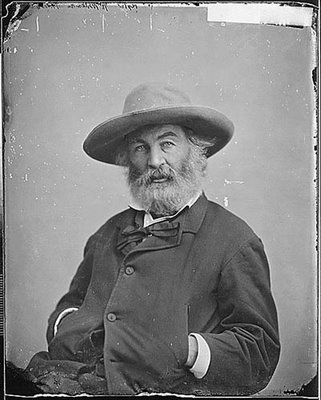| WHY! who makes much of a miracle? | |
| As to me, I know of nothing else but miracles, | |
| Whether I walk the streets of Manhattan, | |
| Or dart my sight over the roofs of houses toward the sky, | |
| Or wade with naked feet along the beach, just in the edge of the water, | |
| Or stand under trees in the woods, | |
| Or talk by day with any one I love—or sleep in the bed at night with any one I love, | |
| Or sit at table at dinner with my mother, | |
| Or look at strangers opposite me riding in the car, | |
| Or watch honey-bees busy around the hive, of a summer forenoon, | |
| Or animals feeding in the fields, | |
| Or birds—or the wonderfulness of insects in the air, | |
| Or the wonderfulness of the sun-down—or of stars shining so quiet and bright, | |
| Or the exquisite, delicate, thin curve of the new moon in spring; | |
| Or whether I go among those I like best, and that like me best—mechanics, boatmen, farmers, | |
| Or among the savans—or to the soiree—or to the opera, | |
| Or stand a long while looking at the movements of machinery, | |
| Or behold children at their sports, | |
| Or the admirable sight of the perfect old man, or the perfect old woman, | |
| Or the sick in hospitals, or the dead carried to burial, | |
| Or my own eyes and figure in the glass; | |
| These, with the rest, one and all, are to me miracles, | |
| The whole referring—yet each distinct, and in its place. | |
|
| To me, every hour of the light and dark is a miracle, | |
| Every cubic inch of space is a miracle, | |
| Every square yard of the surface of the earth is spread with the same, | |
| Every foot of the interior swarms with the same; | |
| Every spear of grass—the frames, limbs, organs, of men and women, and all that concerns them, | |
All these to me are unspeakably perfect miracles.
Walt Whitman (1819-1892)
|


